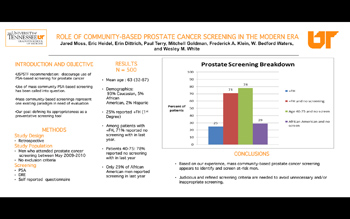WILLIAMSBURG, VA USA (UroToday.com) - The recent and controversial recommendation by the U.S. Preventive Services Task Force (USPSTF) to eliminate PSA-based screening for prostate cancer has forced the urologic community, as a whole, to not only defend but also sharpen current screening strategies.
Mass community-based screening represents one existing paradigm in need of evaluation. We examined our institution’s longitudinal experience with community-based screenings with the explicit goal of defining its appropriateness as a preventative screening tool.
 Methods: A retrospective study was performed to evaluate all men who participated in our cancer center’s mass community screenings between May 2009 and September 2010. There were no exclusion criteria for screening and study participation. Salient demographic and urologic data was self-reported and recorded prospectively at the time of screening. All men subsequently underwent digital rectal examination (DRE) by a board-certified urologist and prostate specific antigen (PSA) testing. The data reviewed contained information regarding patient demographics, family history of prostate cancer, lower urinary tract symptoms (LUTS), prior history of prostate cancer, most recent DRE, and the presence of an established relationship with a urologist.
Methods: A retrospective study was performed to evaluate all men who participated in our cancer center’s mass community screenings between May 2009 and September 2010. There were no exclusion criteria for screening and study participation. Salient demographic and urologic data was self-reported and recorded prospectively at the time of screening. All men subsequently underwent digital rectal examination (DRE) by a board-certified urologist and prostate specific antigen (PSA) testing. The data reviewed contained information regarding patient demographics, family history of prostate cancer, lower urinary tract symptoms (LUTS), prior history of prostate cancer, most recent DRE, and the presence of an established relationship with a urologist.
Results: A total of 500 men underwent screening. Mean age of the cohort was 63 years (range 32-87 years). Ninety-three percent of screened men were Caucasian 5% were African American, and 2% were Hispanic. This cohort was consistent with regional demographics. Twenty-five percent of men reported a known family history of prostate cancer within a first-degree relative. Among patients 40-75 years of age, 78%nreported no screening within the last year, and among men with a family history of prostate cancer, 71% reported no screening within the last year. Additionally, only 29% of African American men had undergone annual screening in the past. Three percent of men reported having a prior history of prostate cancer.
Conclusion: Based on our experience, mass-community-based prostate cancer screening appears to identify and screen at-risk men. Judicious and refined screening criteria are needed to avoid unnecessary and/or inappropriate screening.
Presented by Jared L. Moss, Eric Heidel, Erin Dittrich, Paul Terry, Mitchell Goldman, Frederick A. Klein, W. Bedford Waters and Wesley M. White at the 77th Annual Meeting of the Southeastern Section of the AUA - March 14 - 17, 2013 - Colonial Williamsburg Lodge - Williamsburg, VA USA
University of Tennessee, Graduate School of Medicine, Knoxville, TN USA
View Full SES AUA 2013 Coverage



